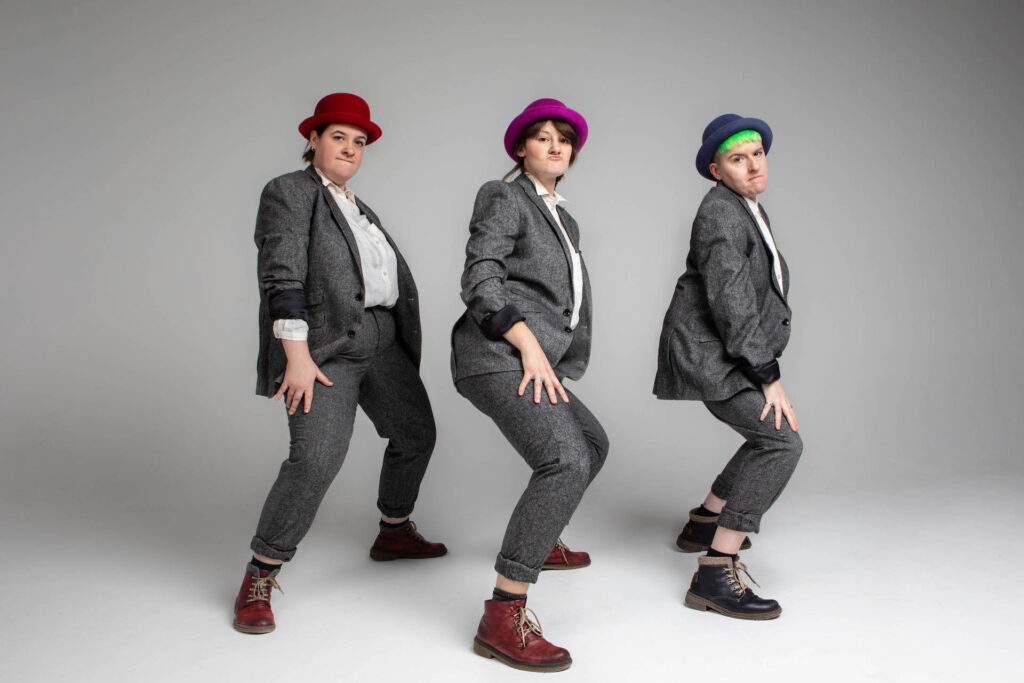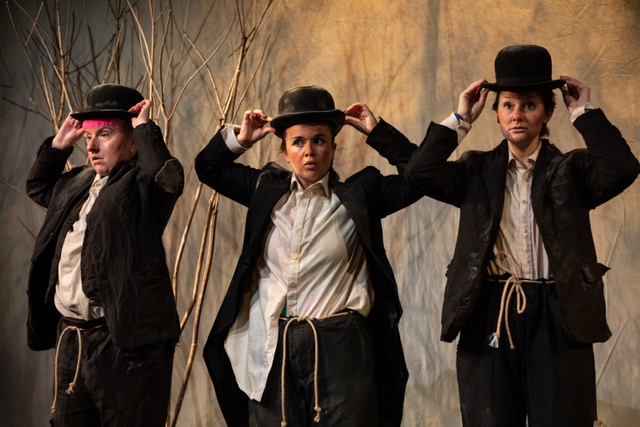
18 May
When ‘Waiting for Godot’ was first performed in London in 1955 critics were sharply divided. Was it two hours of meaningless boredom or was it a masterpiece? In the intervening years, reactions have veered towards the latter and the play has been subjected to countless interpretations as a vehicle for the human condition, whether signalling hope, endurance, despair, or man’s inhumanity to man. Yet there is one interpretation that has always eluded performers. The Beckett estate has refused to allow a non- male cast, except on the understanding that any female actors perform the roles as men.
Silent Faces have taken this intransigence and run with it, in an inventive hour of clowning, mimicry, music and polemic. In so doing, they provoke critical questions about artistic ownership and the seventy-year copyright rule. At its best, Godot is a Woman provokes delight, laughter and crucial artistic and cultural questions, riffing on Beckett’s own language and theatrical style, mingling sharp dialogue with vaudevillian absurdity. Written by the cast, one non-binary (Jack Wakeley ) and two female (Josie Underwood and Cordelia Stevenson) actors, the show is less successful in the second half when it becomes repetitive in its attempt to educate and explain. But, despite longueurs, the performers have created an infectious and manic world onstage. Above all, there is a gentleness in the writing, a respect for the playwright who inspired them. What might have been angry rant is rescued, particularly in the inventive ending, by humour, warmth, and affection.
From the opening, the landscape is familiar. Stage right: a leafless tree, a rocky mound, three pairs of old boots, four bowler hats. The air is misty, thrumming with low key bossa nova. Stage left: a trio of vagrants are crowding around an old-style corded telephone. They are being kept on hold by the Beckett estate. Just as Vladimir and Estragon waited for Godot, Silent Faces wait for an answer. Except that they don’t just wait. They dance and joke and mime with quicksilver changes and a powerful group chemistry. In one of their most dazzling set pieces, in answer to the question ‘What is a man?’ they become manspreading pop idols complete with pelvic thrusts and upraised fists, their beautifully choreographed moves making an absurdity of their inflated male egos. There are many such inventive visual touches, like the heavenly choir accompanying the descent of the play text from above, ever to be snatched beyond reach.
Eventually, tired of waiting, the actor/vagrants decide to take on the estate in their own mock court. Here the humour becomes cruder, less affecting. The music and lyrics of Madonna and others are summoned to suggest the changing mores of the late twentieth and early twenty first century. It’s hard to believe that, had he lived to see and hear her, the 100-year-old Becket would have been moved to change his mind about his play. He was a man of his time, just as Silent Faces are of their time. But out of this conflict, moments of rare humour and insight have been conjured. By the end the team are back to form, moving on from Beckett’s existential cul de sac in startling LGBTQ+ technicolour.
Godot is a Woman played to a packed, attentive house in Oxford and is currently on tour. Among other venues, it can be seen at Taunton’s Brewhouse on Saturday 20th June, The Ustinov Studio Bath on 22nd June and Bristol’s Tobacco Factory, between 28th June and 1st July.
★★★☆☆ Ros Carne 19 May 2023
Photo credit: Ali Wright


